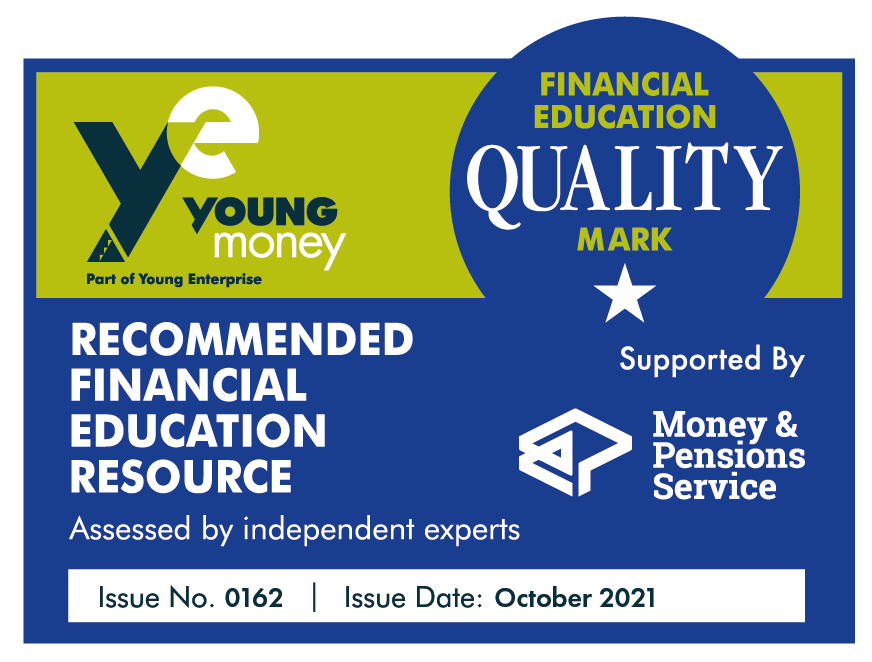HSBC UK
We’re working with HSBC UK to create new, interesting ways for young people to engage with money from an early age, to help them build money skills they’ll use for the rest of their lives.

As Scouts, we’re used to dealing with money. We fundraise for charities, budget for camps, and raise money for jamborees as part of everything we do to build skills for life. Now, we’ve developed badges that focus on fun, active ways for young people to build their money skills.
This isn’t a new idea. Between 1916 and 1925, Scouts could earn the Thriftyman Proficiency Badge, which was all about the importance of practising saving from a young age. Today, we’re taking it a little further. We’re exploring how our money choices can benefit our community, learning about how different people use their money, and having plenty of fun with hands-on activities.
Research by the Money Advice Service tells us that we usually form our habits around money by the age of seven. That’s why we’ve worked with HSBC UK to design these badges for Beavers and Cubs.
The badges aren’t about maths or teaching young people what they should and shouldn’t do with their money. They build on young people’s decision-making skills, help them learn about the things that might influence their choices, and introduce some different cultural practices around money. Above all, they give young people to chance to get stuck in and practise handling money and making their own choices.
The brand new Money Skills Activity Badges are our opportunity to help young people prepare to deal with money, both at Scouts and in their personal lives.
HSBC UK is supporting the Money Heroes project, which is all about financial education for primary school aged children. The project is run by Young Money; their research has helped us to understand the age-appropriate skills, knowledge, and attitudes around money we should develop with this badge. We learned that we needed to cover:
- Becoming a critical consumer
- Managing risks and emotions associated with money
- Understanding the important role money plays in our lives
- How to manage money
As the world adjusts after the pandemic, we hope these badges will help build their confidence as they make their own choices and take care of themselves and others.
We knew that this badge needed to be shaped by expert knowledge, including knowledge of what leaders, young people, and parents wanted from the badges. We set up a working group of diverse volunteers from different religious backgrounds and locations (and with different learning styles and experiences) – and we learned a lot.
Of course, our priority was to make sure the badges:
- promote learning by doing,
- relate to Scout experiences,
- and are as fun and active as possible.
We worked with our dedicated volunteers to design the badge requirements, then tested them around the UK. People’s feedback told us what worked best, and we learned where we needed to make changes to make every activity accessible to young people from all backgrounds.
Through our research, we found that:
- Young people wanted to learn how money works, how to make money, and how to raise money for others.
- Young people and leaders wanted activities that give young people the chance to practise using money in a safe way.
- Some leaders gave us advice on how to respectfully reference their religious practices around money.
- Some leaders told us how to engage young people who struggle with maths by creating practical and creative activities.
- Parents wanted to make sure activities are respectful of people’s different financial backgrounds.
There are four requirements for Beavers and five for Cubs. We’ve created at least two new, practical, fun activities for each requirement, which have been tested and enjoyed by real Scout groups.
In the next couple of years, we’ll release more activities. We want to include some that focus on using digital tools and elements of online gaming. During our testing, some leaders invented their own activities – they blew us away with their creativity, so we’ll be working with them later on in the project to include their ideas too.
Discover the new badges
HSBC UK have supported us to create a fun and practical new Money Skills Activity Badge for Beavers and Cubs. We’ve created the badge using research from Young Money and working with volunteers and young people across the UK.

Don’t expect to become rich all at once. To get to big things you have to begin with little things, just as before you grow to be a big adult you must be a small child.
Wolf Cubs Handbook, 1916
Top quality
Our HSBC UK activities linked have been awarded the Financial Education Quality Mark from Young Money for being high quality, accurate, engaging and relevant.
Find out more about this awardTry the activities
Show that you know the values of different coins and notes, then design one of your own.
Coin design
Use your imagination to design your own brand-new coin.
Ages: 6 to 10½ | Takes: 30 minutes
Try Coin designLearning about coins
Learn about the designs on British coins – can you recognise them with your eyes shut?
Ages: 6 to 8 | Takes: 30 minutes
Learn about coinsChoose something to save and keep track of how much (or how many) you have. You can collect anything you like – it doesn’t have to be money.
Bank a recycled robot
Decide what makes the best robot, then work together to save tokens and turn your vision into reality.
Ages: 6 to 10½ | Takes: 2 hours (over two sessions)
Try Bank a recycled robotThe marshmallow experiment
Is a marshmallow in your hand worth two in the future?
Ages: 6 to 10½ | Takes: 10 minutes
Try the marshmallow experimentMake your own bank
Create a safe place for you to collect your favourite things, and your own way of how you keep track of it.
Ages: 6 to 10½ | Takes: 1 hour
Make your own bankShow how you make decisions between what you want, what you need, and what you donate or share. You could use objects, money, or online experiences.
Pack your bags
Figure out the difference between a need and a want and decide what to take on your trip based on the space you have in your bag.
Ages: 6 to 8 | Takes: 30 minutes
Try Pack your bagsBudget building
Work together to make the best budget and build the biggest tower in this team challenge.
Ages: 6 to 10½ | Takes: 30 minutes
Try Budget buildingHoney makes the world go round
Join your Bee-ver colony, go out foraging for nectar, and help out the other bees along the way.
Ages: 6 to 10½ | Takes: 15 minutes
Try Honey makes the world go roundChoose a creative way to explain the history of money and the different ways we can spend money today.
It’s a money old world
Learn about the history (and geography) of money, then choose a creative way to show how it’s changed over the years.
Ages: 6 to 8 | Takes: 45 minutes
Try It’s a money old worldShow you know about foreign currency by explaining how a Scout from another country would exchange their money if they came to a camp in the UK.
Scout pound
Make your own money and learn about currency exchange in this creative challenge.
Ages: 8 to 10½ | Takes: 1 hour
Try Scout poundMoney maps
Work together to create a map of different currencies around the world. What does the same amount of money look like in different countries?
Ages: 6 to 10½ | Takes: 40 minutes
Try Money mapsCoin design
Use your imagination to design your own brand-new coin.
Ages: 6 to 10½ | Takes: 30 minutes
Try Coin designShow how you’d create a budget for a Scouts activity. Think about value for money, as well as how other values (such as supporting local businesses, making ethical choices, or protecting the environment) might affect your budget.
Value menu
Choose a cause to support as you plan meals for an international camp.
Ages: 8 to 10½ | Takes: 45 minutes
Try Value menuHow much munch
Work together to beat the budget and create a tasty meal for your next camp.
Ages: 8 to 10½ | Takes: 45 minutes
Try How much munchBudget building
Work together to make the best budget and build the biggest tower in this team challenge.
Ages: 6 to 10½ | Takes: 30 minutes
Try Budget buildingLearn about the things that can influence different people’s spending decisions (from religious beliefs to adverts and peer pressure) and create a list of things that might influence your spending decisions.
Zakat
Advert icebreaker
Advert savvy
Create a comic strip of your day and think about the different ways adverts can influence you.
Ages: 8 to 10½ | Takes: 30 minutes
Become advert savvyTalk with your group about how people from different cultures can gain, save, and give away money, and choose a way of gaining, saving, or giving away money that you’d like to try.
Requirement four, Cubs Money Skills Activity Badge
Shopping story
If you want something, lots has to happen before you get it. Can you turn the stages into a story?
Ages: 8 to 10½ | Takes: 45 minutes
Try Shopping storyThe marshmallow experiment
Is a marshmallow in your hand worth two in the future?
Ages: 6 to 10½ | Takes: 10 minutes
Try The marshmallow experimentMake your own bank
Create a safe place for you to collect your favourite things, and your own way of how you keep track of it.
Ages: 6 to 10½ | Takes: 1 hour
Make your own bankCreate a guide for how young people can recognise and protect themselves from online scams and counterfeit (fake) money.
Requirement five, Cubs Money Skills Activity Badge
Go phish
Learn how to be scam-savvy online and put your pretend passwords to the test.
Ages: 8 to 10½ | Takes: 20 minutes
Try Go phishSecurity money
Can you tell the real deal from the fakes in this money making match?
Ages: 8 to 10½ | Takes: 45 minutes
Try Security money

